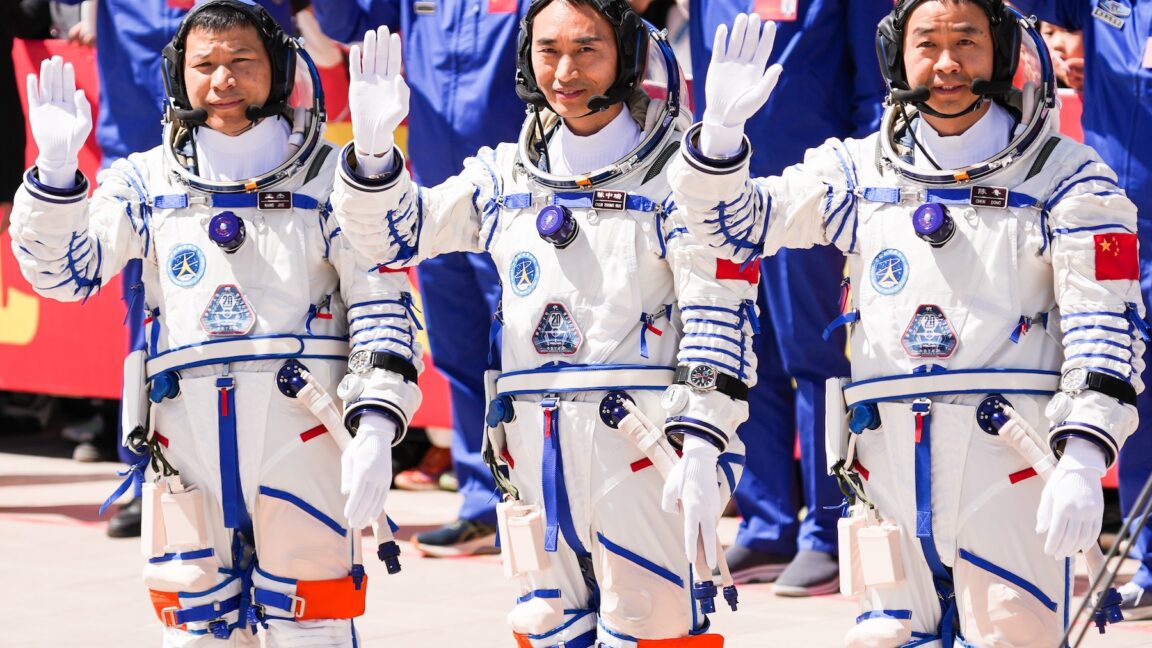Chinese Space Program’s Flawed Ambitions Exposed as Astronauts Grounded by Space Debris Threat
Three Chinese astronauts were poised to make a significant return from the Tiangong space station, a symbol of China’s growing prowess in space exploration. However, their planned departure has been abruptly postponed due to concerns over potential damage from space debris to their landing craft, the Shenzhou 20. This incident has raised serious questions about the safety protocols and the overall reliability of China’s ambitious space program.
The China Manned Space Agency, which operates under the auspices of the military, issued a statement on Weibo, acknowledging the situation. The agency reported that the Shenzhou 20 spacecraft is suspected of having been impacted by small space debris, prompting an immediate risk assessment and impact analysis. This decision to delay the astronauts’ return, initially scheduled for November 5, highlights the complexities and dangers associated with space travel, especially as more countries and private entities enter the realm of space exploration.
Space debris—a term that encompasses defunct satellites, spent rocket stages, and fragments from previous collisions—has become a growing concern for all space-faring nations. The increasing number of objects in Earth’s orbit poses significant risks to operational spacecraft and astronauts. As the global space community expands, the potential for collisions with these remnants of past missions rises, necessitating stringent safety measures and protocols.
China’s space ambitions have been on a rapid ascent in recent years, marked by milestones such as the successful launch of the Tiangong space station and crewed missions that have captured the world’s attention. However, this recent incident serves as a stark reminder of the inherent risks involved in such endeavors. The fact that the Shenzhou 20 mission was postponed due to concerns over space debris raises critical questions about the preparedness of the Chinese space program to handle unforeseen challenges.
The implications of this incident extend beyond the immediate safety of the astronauts. It reflects a broader issue within the realm of space exploration—namely, the need for comprehensive international cooperation in addressing the growing problem of space debris. As more nations and private companies launch missions, the responsibility to maintain a safe and sustainable orbital environment becomes increasingly pressing. The potential for catastrophic collisions could have dire consequences not only for astronauts but also for the future of space exploration itself.
Historically, the issue of space debris has been acknowledged by various space agencies around the world. The United Nations Office for Outer Space Affairs has called for collaborative efforts to mitigate space debris, emphasizing the need for guidelines and best practices. However, the challenge remains daunting, as the sheer volume of debris continues to increase. As nations like China push forward with their space initiatives, they must also confront the reality of their environmental impact on the orbital ecosystem.
The postponement of the Shenzhou 20 mission also invites scrutiny regarding the transparency and communication of the Chinese space program. In a field where public trust and international collaboration are vital, the handling of such incidents can significantly affect perceptions of a nation’s capabilities and intentions. The military oversight of the China Manned Space Agency adds another layer of complexity, as the dual-use nature of space technology often raises concerns among other nations.
The ramifications of this incident could reverberate throughout the global space community, influencing future collaborations and partnerships. Countries may become more cautious in their dealings with China, particularly if concerns about safety and reliability persist. The geopolitical landscape of space exploration is already fraught with tension, and incidents like this could exacerbate existing rivalries.
As the investigation into the Shenzhou 20 spacecraft’s condition continues, the world watches closely. The outcome will not only determine the fate of the astronauts but also shape the future trajectory of China’s space ambitions. Will the country be able to reassure the global community of its commitment to safe and responsible space exploration, or will this incident serve as a cautionary tale of the perils that lie ahead?
In the meantime, the astronauts remain aboard the Tiangong space station, a remarkable achievement in its own right, but one that now carries the weight of uncertainty. The complexities of space travel, the risks of debris, and the challenges of international cooperation all converge in this moment, underscoring the delicate balance that must be maintained in the pursuit of knowledge beyond our planet. As engineers analyze the situation and assess the risks, the broader implications of this incident will continue to unfold, prompting a reevaluation of priorities in the ever-evolving landscape of space exploration.
Three Chinese astronauts were due to depart the Tiangong space station, reenter the atmosphere, and land in the remote desert of Inner Mongolia on Wednesday. Instead, officials ordered the crew to remain at the station while engineers investigate a potential problem with their landing craft.
The China Manned Space Agency, run by the country’s military, announced the change late Tuesday in a brief statement posted to Weibo, the Chinese social media platform.
“The Shenzhou 20 manned spacecraft is suspected of being impacted by small space debris,” the statement said. “Impact analysis and risk assessment are underway. To ensure the safety and health of the astronauts and the complete success of the mission, it has been decided that the Shenzhou 20 return mission, originally scheduled for November 5, will be postponed.”

